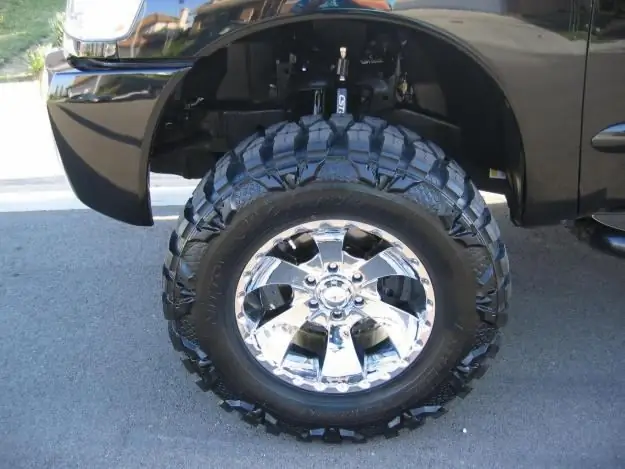- Author Maria Gibbs [email protected].
- Public 2023-12-16 03:05.
- Last modified 2025-01-22 17:47.
The choice of rubber for an SUV is more difficult than for a passenger car. And there are two reasons for this. First, jeeps are used in various road conditions. Secondly, these cars are heavier than passenger cars, and therefore the individual qualities of tires acquire a higher degree of importance.

Instructions
Step 1
First of all, evaluate what qualities in tires are most important to you: on-road or off-road. Asphalt tires are more comfortable, improve handling and braking properties of the car. Off-road models have a more brutal appearance and high off-road performance, but are very noisy on asphalt. Take this stage of choice very seriously, as road and off-road characteristics are diametrically opposed, and the same rubber cannot combine both characteristics.
Step 2
If you use an SUV on weekdays for city trips, and on weekends for traveling to the country, fishing, hunting, etc., purchase two sets of wheels. One is for asphalt roads, the other is for real off-road. And so that you can change the rubber every time as quickly as possible, change it along with the disks. This is also useful because stamped steel wheels are more difficult to damage off-road than cast light-alloy wheels.
Step 3
Be sure to pay attention to the fact that all four wheels have tires of the same model, with the same tread pattern and preferably with the same wear. This is very important for an SUV, since its weight and all-wheel drive factor impose increased requirements on such indicators and characteristics, as well as on the strength of the sidewalls. If possible, choose tires that are stronger and have a higher profile height.
Step 4
Do not assume that having all-wheel drive will allow you to operate the car with all-season tires all year round. In fact, most SUVs have a disengageable four-wheel drive (automatic or forced). Consequently, on asphalt, a mono drive is most often used. And all the disadvantages inherent in all-season tires are fully manifested, amplified by the increased weight of the jeep. Therefore, strive with the onset of winter or summer to change tires for the appropriate seasonal, just as the owners of cars do.
Step 5
Consider some of the nuances of choosing wheels. For example, when buying road tires for a heavy SUV, ignore their drainage capabilities. Water from under the wheels of such a machine will be displaced more by its mass than by water-displacing properties. Also, the heavier your jeep is, the more attention is paid to braking performance. A massive car is much more difficult to stop, and tires play an important role in this.
Step 6
When making a choice between brands and manufacturers of tires, pay attention to what standard tires are installed on new SUVs by its manufacturer. As a rule, the tires installed by the manufacturer are considered to be the best for the given model.






